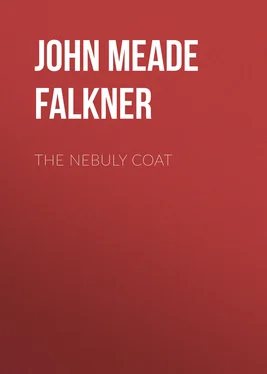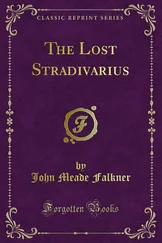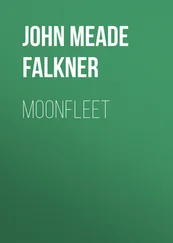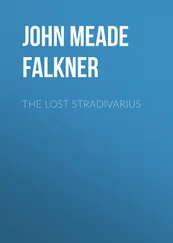John Meade Falkner - The Nebuly Coat
Здесь есть возможность читать онлайн «John Meade Falkner - The Nebuly Coat» — ознакомительный отрывок электронной книги совершенно бесплатно, а после прочтения отрывка купить полную версию. В некоторых случаях можно слушать аудио, скачать через торрент в формате fb2 и присутствует краткое содержание. Жанр: foreign_antique, foreign_home, architecture_book, на английском языке. Описание произведения, (предисловие) а так же отзывы посетителей доступны на портале библиотеки ЛибКат.
- Название:The Nebuly Coat
- Автор:
- Жанр:
- Год:неизвестен
- ISBN:нет данных
- Рейтинг книги:3 / 5. Голосов: 1
-
Избранное:Добавить в избранное
- Отзывы:
-
Ваша оценка:
- 60
- 1
- 2
- 3
- 4
- 5
The Nebuly Coat: краткое содержание, описание и аннотация
Предлагаем к чтению аннотацию, описание, краткое содержание или предисловие (зависит от того, что написал сам автор книги «The Nebuly Coat»). Если вы не нашли необходимую информацию о книге — напишите в комментариях, мы постараемся отыскать её.
The Nebuly Coat — читать онлайн ознакомительный отрывок
Ниже представлен текст книги, разбитый по страницам. Система сохранения места последней прочитанной страницы, позволяет с удобством читать онлайн бесплатно книгу «The Nebuly Coat», без необходимости каждый раз заново искать на чём Вы остановились. Поставьте закладку, и сможете в любой момент перейти на страницу, на которой закончили чтение.
Интервал:
Закладка:
“For evil hands have abbey lands,
Such evil fate in store;
Such is the heritage that waits
Church-robbers evermore.”
Thus, in the next generation the name of Shearman was clean put away; but Sir John Fynes, purchasing the property, founded the Grammar School and almshouses as a sin-offering for the misdoings of his predecessors. This measure of atonement succeeded admirably, for Horatio Fynes was ennobled by James the First, and his family, with the title of Blandamer, endures to this present.
On the day before the formal dissolution of their house the monks sung the last service in the abbey church. It was held late in the evening, partly because this time seemed to befit such a farewell, and partly that less public attention might be attracted; for there was a doubt whether the King’s servants would permit any further ceremonies. Six tall candles burnt upon the altar, and the usual sconces lit the service-books that lay before the brothers in the choir-stalls. It was a sad service, as every good and amiable thing is sad when done for the last time. There were agonising hearts among the brothers, especially among the older monks, who knew not whither to go on the morrow; and the voice of the sub-prior was broken with grief, and failed him as he read the lesson.
The nave was in darkness except for the warming-braziers, which here and there cast a ruddy glow on the vast Norman pillars. In the obscurity were gathered little groups of townsmen. The nave had always been open for their devotions in happier days, and at the altars of its various chapels they were accustomed to seek the means of grace. That night they met for the last time—some few as curious spectators, but most in bitterness of heart and profound sorrow, that the great church with its splendid services was lost to them for ever. They clustered between the pillars of the arcades; and, the doors that separated the nave from the choir being open, they could look through the stone screen, and see the serges twinking far away on the high altar.
Among all the sad hearts in the abbey church, there was none sadder than that of Richard Vinnicomb, merchant and wool-stapler. He was the abbot’s elder brother, and to all the bitterness naturally incident to the occasion was added in his case the grief that his brother was a prisoner in London, and would certainly be tried for his life.
He stood in the deep shadow of the pier that supported the north-west corner of the tower, weighed down with sorrow for the abbot and for the fall of the abbey, and uncertain whether his brother’s condemnation would not involve his own ruin. It was December 6, Saint Nicholas’ Day, the day of the abbot’s patron saint. He was near enough to the choir to hear the collect being read on the other side of the screen:
“ Deus qui beatum Nicolaum pontificem innumeris decorasti miraculis: tribue quaesumus ut ejus mentis, et precibus, a gehennae incendiis liberemur, per Dominum nostrum Jesum Christum. Amen .”
“Amen,” he said in the shadow of his pillar. “Blessed Nicholas, save me; blessed Nicholas, save us all; blessed Nicholas, save my brother, and, if he must lose this temporal life, pray to our Lord Christ that He will shortly accomplish the number of His elect, and reunite us in His eternal Paradise.”
He clenched his hands in his distress, and, as a flicker from the brazier fell upon him, those standing near saw the tears run down his cheeks.
“ Nicholas qui omnem terram doctrina replevisti, intercede pro peccatis nostris ,” said the officiant; and the monks gave the antiphon:
“ Iste est qui contempsit vitam mundi et pervenit ad coelestia regna .”
One by one a server put out the altar-lights, and as the last was extinguished the monks rose in their places, and walked out in procession, while the organ played a dirge as sad as the wind in a ruined window.
The abbot was hanged before his abbey gate, but Richard Vinnicomb’s goods escaped confiscation; and when the great church was sold, as it stood, for building material, he bought it for three hundred pounds, and gave it to the parish. One part of his prayer was granted, for within a year death reunited him to his brother; and in his pious will he bequeathed his “sowle to Allmyhtie God his Maker and Redemer, to have the fruition of the Deitie with Our Blessed Ladie and all Saints and the Abbey Churche of Saint Sepulchre with the implements thereof, to the Paryshe of Cullerne, so that the said Parishioners shall not sell, alter, or alienate the said Churche, or Implements or anye part or parcell thereof for ever.” Thus it was that the church which Westray had to restore was preserved at a critical period of its history.
Richard Vinnicomb’s generosity extended beyond the mere purchase of the building, for he left in addition a sum to support the dignity of a daily service, with a complement of three chaplains, an organist, ten singing-men, and sixteen choristers. But the negligence of trustees and the zeal of more religious-minded men than poor superstitious Richard had sadly diminished these funds. Successive rectors of Cullerne became convinced that the spiritual interests of the town would be better served by placing a larger income at their own disposal for good works, and by devoting less to the mere lip-service of much daily singing. Thus, the stipend of the Rector was gradually augmented, and Canon Parkyn found an opportunity soon after his installation to increase the income of the living to a round two thousand by curtailing extravagance in the payment of an organist, and by reducing the emoluments of that office from two hundred to eighty pounds a year.
It was true that this scheme of economy included the abolition of the week-day morning-service, but at three o’clock in the afternoon evensong was still rehearsed in Cullerne Church. It was the thin and vanishing shadow of a cathedral service, and Canon Parkyn hoped that it might gradually dwindle away until it was dispersed to nought. Such formalism must certainly throttle any real devotion, and it was regrettable that many of the prayers in which his own fine voice and personal magnetism must have had a moving effect upon his hearers should be constantly obscured by vain intonations. It was only by doing violence to his own high principles that he constrained himself to accept the emoluments which poor Richard Vinnicomb had provided for a singing foundation, and he was scrupulous in showing his disapproval of such vanities by punctilious absence from the week-day service. This ceremony was therefore entrusted to white-haired Mr Noot, whose zeal in his Master’s cause had left him so little opportunity for pushing his own interests that at sixty he was stranded as an underpaid curate in the backwater of Cullerne.
At four o’clock, therefore, on a week-day afternoon, anyone who happened to be in Saint Sepulchre’s Church might see a little surpliced procession issue from the vestries in the south transept, and wind its way towards the choir. It was headed by clerk Janaway, who carried a silver-headed mace; then followed eight choristers (for the number fixed by Richard Vinnicomb had been diminished by half); then five singing-men, of whom the youngest was fifty, and the rear was brought up by Mr Noot. The procession having once entered the choir, the clerk shut the doors of the screen behind it, that the minds of the officiants might be properly removed from contemplation of the outer world, and that devotion might not be interrupted by any intrusion of profane persons from the nave. These outside Profane existed rather in theory than fact, for, except in the height of summer, visitors were rarely seen in the nave or any other part of the building. Cullerne lay remote from large centres, and archaeologic interest was at this time in so languishing a condition that few, except professed antiquaries, were aware of the grandeur of the abbey church. If strangers troubled little about Cullerne, the interest of the inhabitants in the week-day service was still more lukewarm, and the pews in front of the canopied stalls remained constantly empty.
Читать дальшеИнтервал:
Закладка:
Похожие книги на «The Nebuly Coat»
Представляем Вашему вниманию похожие книги на «The Nebuly Coat» списком для выбора. Мы отобрали схожую по названию и смыслу литературу в надежде предоставить читателям больше вариантов отыскать новые, интересные, ещё непрочитанные произведения.
Обсуждение, отзывы о книге «The Nebuly Coat» и просто собственные мнения читателей. Оставьте ваши комментарии, напишите, что Вы думаете о произведении, его смысле или главных героях. Укажите что конкретно понравилось, а что нет, и почему Вы так считаете.











